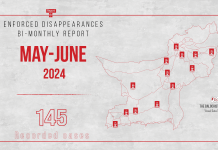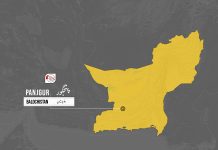On Wednesday, the Majeed Brigade, the elite squad of the Baloch Liberation Army (BLA) known for targeting Pakistani and Chinese interests in Balochistan, launched another attack, this time against Pakistan’s intelligence agencies. At approximately 3:30 pm, eight ‘fidayee’ (self-sacrificing) fighters of the Brigade infiltrated the Gwadar Port Authority Complex, which houses important government buildings, such as the Wapda and ECP offices, alongside the headquarters of security forces and intelligence agencies. They reportedly seized control of the premises for several hours, engaging in an intense combat with the security forces and intelligence personnel present, killing 25 and injuring several others.
The attack in Gwadar follows a significant assault in Mach, Bolan, during the final week of January. In that earlier confrontation, 13 Majeed Brigade combatants, along with members from BLA’s Special Tactical Operations Squad (STOS), Fateh Squad, and Intelligence Wing, orchestrated a substantial offensive against the security forces, reportedly seizing the control of the city for more than two days.
Almost an hour after the first bullets were fired, residents of Gwadar reported hearing gunshots and explosions. The photos of the scene, which were immediately circulated on social media, made it evident that a significant attack was underway in Gwadar. The photos and videos showed plumes of thick, black smoke emanating from the compound, as gunshots echoed in the distance. The Baloch Liberation Army (BLA), an armed group fighting for the independence of Balochistan, immediately claimed responsibility for the attack in a media statement. They stated that eight of their fighters had targeted the Pakistan intelligence agencies in Gwadar.
When the incident was reported, a large contingent of police and other law enforcement agencies rushed to the scene, attempting to counter the attackers. An intense firefight ensued, between the BLA fighters and the Pakistani security forces, marked by frequent blasts. This confrontation lasted for several hours and ultimately led to the death of the 8 BLA fighters, reportedly along with 25 personnel from the Pakistani security forces and intelligence agencies.
The Inter-Services Public Relations (ISPR), the media wing of Pakistan’s military, issued a statement following the attack. They claimed that the attack on the Gwadar Port Authority was “successfully thwarted by the security forces personnel.” According to the ISPR, the eight “terrorists” were killed by the security forces. They also reported that two soldiers of the Pakistani forces, Sepoy Bahar Khan from Dera Ghazi Khan and Sepoy Imran Ali from Khairpur, were killd in the attack.
As the news of the attack broke in the mainstream media, a wave of condemnations followed by Pakistani authorities. Pakistani Primier Shehbaz Sharif, in a statement, commended the security forces for their “valour and professional skill in neutralizing the threat”. He paid homage to the soldiers of the security forces and pledged to “thwart all internal and external conspiracies with the people’s support.”
Pakistani President Asif Ali Zardari condemned the Gwadar assault and praised the security forces for their successful “thwarting” of the attack, asserting that “terrorist elements” would be confronted with force.
Balochistan Chief Minister Safraraz Bugti also admired the security forces’ response, saying that it sent a “loud and clear” message that any violence against the state would be met with force.
BLA’s Operation ZirPahazag
The Baloch Liberation Army (BLA) released a statement following the attack in Gwadar, marking it as the fourth attack under ‘Operation ZirPahazag.’ This campaign, according to the BLA, is an armed effort to defend the coasts of Balochistan and resist the Pakistani state’s presence, which they view as an occupation. The BLA also aims to expel entities that are exploiting the region’s resources.
‘Operation ZirPahazag’ commenced in May 2019 with its first attack, executed by the Majeed Brigade at the Pearl Continental Hotel in Gwadar. The second offensive occurred in August 2021, when a young fighter from the Majeed Brigade, Umar Jan, known as Sarbuland, targeted a convoy of Chinese engineers and Pakistani law enforcement. The third assault took place in August 2023, with BLA combatants Naveed Baloch, also known as Aslam Baloch, and Maqbool Baloch, alias Qaim Baloch, attacking Chinese nationals and their security detail in Gwadar. The latest incident on Wednesday is the continuation of these series of attacks.
The Baloch Liberation Army (BLA) said that the attack was executed by eight members of the Majeed Brigade against the Pakistani intelligence agencies, ISI and MI. The BLA claimed that these fighters – ‘fidayees’— set a new, unreachable standard of bravery with their sacrifice, becoming etched in the Baloch nation’s memory. The attack reportedly resulted in the deaths of at least 25 personnel from the Pakistani forces and intelligence agencies, including 6 MI officials (among them two commissioned officers), 8 ISI officials, and 14 members of the Pakistani army and navy.
According to the BLA, the operation targeted the Pakistani intelligence agencies’ headquarters in Gwadar when a meeting was underway inside. The confrontation lasted several hours, resulting in the deaths of intelligence officials, as well as several army and navy commandos and members of death squads.
The BLA accused the Pakistani intelligence agencies of leading genocidal policies in Balochistan, alleging their involvement in enforced disappearances, torture, and the killing of innocent Baloch people. The group said that the genocidal policies of Pakistani state have led to the deaths of thousands of innocent Baloch people over the past two decades.
BLA identifies the eight fighters involved in the attack:
1. Shoukat Hakeem (alias Safar Khan) from Gazgi, Khuzdar. Joined BLA in 2021 and volunteered for the Majeed Brigade in 2022.
2. Babar Nasir (alias Sohail) from Malikabad, Turbat. Joined BLA in 2020 and volunteered for the Majeed Brigade in 2022.
3. Sawali (alias Meerain) from Tijaban, Kech. Joined BLA in 2020 and volunteered for the Majeed Brigade in 2023. He previously contributed to the Baloch cause through the Baloch Students’ Organization.
4. Muslim Mehar (alias Salaar) from Buleda, Kech. Joined BLA and volunteered for the Majeed Brigade in 2023.
5. Kareem Jan (alias Zoraan) from Aapsar, Turbat. He was detained and tortured by Pakistani forces in 2022 before he joined BLA and volunteered for the Majeed Brigade in 2023.
6. Marwan (alias Mehrab) from Buleda, Kech. Joined BLA in 2021 and volunteered for the Majeed Brigade.
7. Khuda Dost (alias Asad Ibn Saira Bibi) from Gishkor, Awaran. He studied political science before joining BLA in 2020 and volunteering for the Majeed Brigade in 2021.
8. Riaz Illahi (alias Jangi Khan) from Buleda, Kech. Joined BLA in 2017 and volunteered for the Majeed Brigade in 2020.
Broader Implication of BLA’s Fidayeen Missions
The recent attack in Gwadar by the Majeed Brigade of the Baloch Liberation Army (BLA) has reignited discussions about their strategic objectives and the broader implications for challenging both Pakistani and foreign interests in Balochistan.
Amir Rana, Director of the Pakistan Institute of Peace Studies and a recognized expert on extremism and militancy, highlighted the political objectives and successes of these missions in a BBC Urdu report.
He notes the increasing intensity of ‘fidayeen’ attacks within Baloch militancy in Pakistan, attributing this trend to the involvement of educated youth and their access to global guerrilla movement information. “These young, educated individuals have easy access to information, making them aware of various guerrilla movements around the world. They learn which types of attacks could potentially have a greater impact,” he explained.
Rana further argues that the success of ‘fidayeen’ missions is measured not only by the execution of the attack but also by the attention it garners. “Even if the mission itself fails, it still gets enough coverage to become an issue for the state because the purpose of these attacks is to convey a message, in which they remain remarkably successful.”
Fakhar Kakakhel, an independent analyst specializing in militancy in Pakistan, described the Gwadar attack as symbolically significant. “It made headlines, which is precisely what the Baloch insurgents aim for. The BLA wanted to register a message that, despite strict security measures, they are able to reach their targets.”
Kiyya Baloch, another independent analyst tracking militancy in Balochistan, stressed the strategic success of executing attacks within Gwadar, particularly in such a high-security zone. “Through this attack, Baloch separatists delivered a message to the world that Gwadar is not safe to invest in, for China or any other interested foreign party.”
The recent Gwadar attack, as part of the ‘Operation ZirPahazag’ series, not only highlights the BLA’s evolving military capabilities but also showcases their sophisticated mastery of surveillance, intelligence gathering, and modern warfare tactics. Their ability to penetrate highly secured zones underscores the BLA’s capacity to launch significant attacks at any chosen location.
The Baloch Liberation Army (BLA) said that the Gwadar attack serves as a warning to foreign investors who trust the Pakistani state’s false assurances and plan to invest in Balochistan. The group asserted that its ability to strike Pakistan’s secretive agencies within a highly secure facility and maintain control for several hours demonstrates their capability to execute attacks at any location.






























